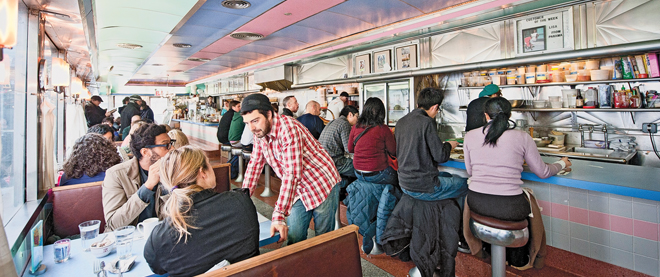Here’s a tip: enough with the slacker service
A restaurant critic sets off a storm about bad treatment in expensive restaurants
Evan Sung/The New York Times/Redux
Share

A few months ago, Alan Richman, GQ’s veteran restaurant critic, set out to write a cultural-phenomenon piece about M. Wells, a year-old shabby-chic diner in Queens, N.Y., and that borough’s first destination restaurant. Gourmands flocked for its over-the-top “Quebeco-American” cuisine—foie gras tamales, côte-de-boeuf and fried soft-shell-crab combo plates, duck testicles, tourtières—and a gonzo vibe presided over by the husband and wife team of Sarah Obraitis and Hugue Dufour, he a former partner at Montreal’s celebrated Au Pied de Cochon.
But Richman’s now-notorious takedown of the restaurant’s attitude in the current GQ—which identifies the “post-service era”—has become a phenomenon itself, and hit a nerve among diners fed up with bored servers asking, “Which of you guys ordered the pork belly?” During his first two visits, Richman writes, he was wowed by some of the food and noted Obraitis ran the place with “charm” if not rigour. Visit three was a disaster. His table waited 45 minutes between courses; he was curt with a female server and one of his guests kvetched loudly. The next day he was shocked to receive an angry email from Obraitis accusing his table of being impossible to please and Richman of patting the server on her behind, a charge he denies and concludes was made to “intimidate” him and stop him from writing an unflattering review. It didn’t.
The resulting piece is a bizarre hybrid: part review, part psycho-drama, part self-defence and part mea culpa. Had Obraitis not made her sexual-harassment accusation, Richman writes, he’d have overlooked servers’ “egregious manners.” But the shock of it caused the scales to fall from his eyes: M. Wells’s “chipped plates, distracted staff, and badly washed glasses,” he realizes, are unacceptable in a joint charging US$42 for a hamburger.
It’s far from the first sacred cow the courtly curmudgeon has taken on. His harsh if droll analysis of New Orleans and its overhyped cuisine post-Katrina summoned hate mail (“I know we are supposed to salvage what’s left of the city, but what exactly is it that we’re trying to cherish and preserve?” he wrote). Now that he’s hit a collective nerve, the pitchforks have been lowered. One online commenter saw the column signalling “the beginning of the end for hipster service standards.” Other comments reveal the extent to which sadistic treatment is an accepted part of fashionable dining: a Huffington Post blogger admitted waiting for two hours after her reservation time to be seated at M. Wells. An M. Wells boycott was even proposed, which will be tricky: the week Richman’s review appeared (and Bon Appetit named it one of America’s “Top 10 new restaurants”), M. Wells announced it was shuttering at August’s end due to a rent dispute, but will reopen nearby.
The positive feedback has been gratifying, Richman says from his home in Westchester, N.Y: “For once in my life it wasn’t ‘Alan Richman: the asshole,’ it was ‘Alan Richman: just like me.’ ” He won’t discuss the bottom-patting allegation, nor has M. Wells, which didn’t respond to a Maclean’s interview request. (Brett Martin, fellow GQ writer, summed up the consensus on Twitter: “I love(d) M Wells but c’mon. Alan Richman: pain in all butts but patter of none.”) But Richman has much to say about how subpar service “snuck up on us” with the rise of casual dining. Insecurity of appearing like old codgers inhibited critics, he says: “We’d appear out of touch if we disapproved.”
Now he speaks with the zeal of the newly converted. “People should demand well-trained waiters and restaurants run as if there is someone in charge.” He half jokes he’d like to see unemployed actors back in the service business: “They were far better waiters than the ones we see now.” A 10 per cent tip is acceptable if the service has been perfunctory, he says. Yet he always tips 20 per cent or close to it, and did at M. Wells: “My tips do not reflect the quality of service; I’m in the business and I don’t want to be known as a cheapskate.” Future Richman servers: you’ve been forewarned.